Closed flipdazed closed 8 years ago
The Av. change in hamiltonian not as high as thought. Was not measuring the change - was measuring the absolute value! Edited... main issue post with respect to this.
MVG
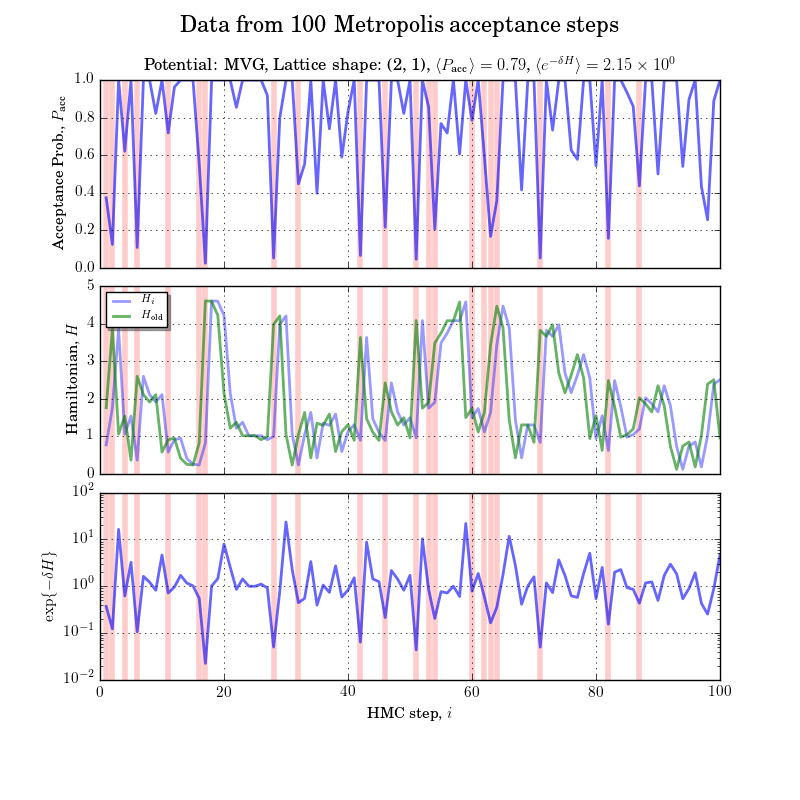
did a full scan of KG potential... (same as QHO with params all set to 1) which looks as if it should be varying as much as indicated above: The values of |1 - exp{-\delta H}| are only varying by ~0.2 !!!
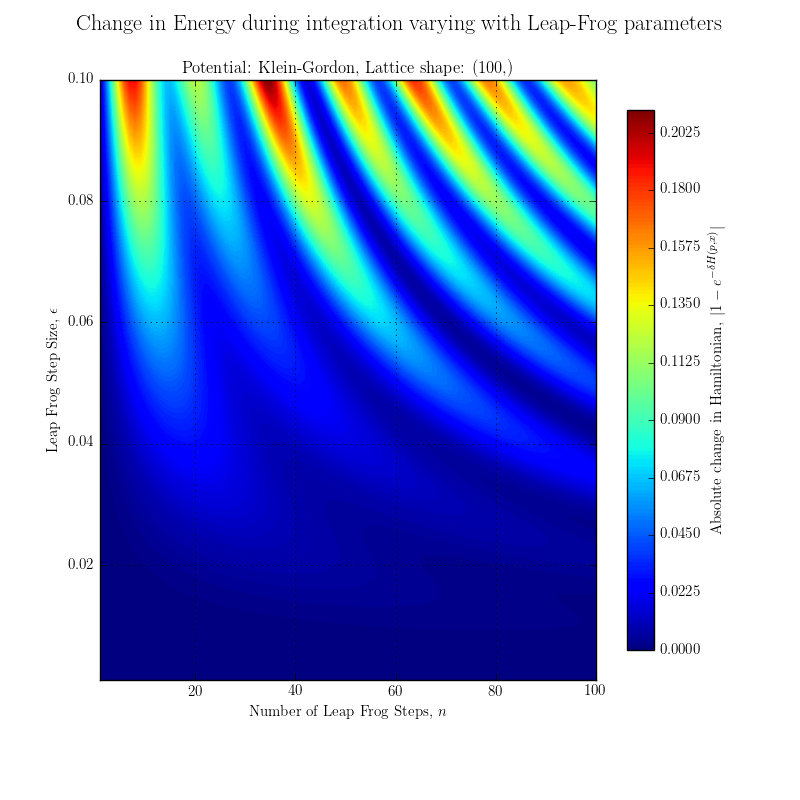
ADK This can take a while to reach it equilibrium value $\langle\exp{-\delta H}\rangle = 1$. Ensure that a. You only start measuring after reaching equilibrium. b. Think carefully what value of $\delta H$ to use upon a Metropolis rejection (look at the proof if unsure).
h_new from after the metropolis rejectionw.r.t. the metropolis acc / res … I excluded the burn-in but I was calculating $\delta H = H{new} - H{old}$ on a rejection, which I suspect should have really been $\delta H = H{old} - H{old}= 0$ as the new configuration was rejected and $H{old} = H{new}$. This is in fact what the sampler does but I was extracting $H{new}$ from within the Metropolis class before it fixed the value for $H{new}$ inside the parent HMC class. I didn’t occur to me to use the assigned value of $H{new}$ rather than the intermediate value of $H{new}$.
ADK Remember the proof: $$Z = \int dp\,dq\, e^{-H(q,p)} = \int dp’\,dq’\, e^{-H(q’,p’)}$$ $$=\int dp\,dq\, e^{-H(q’,p’)} = \int dp\,dq\, e^{-\delta H(q,p)} e^{-H(q,p)} = Z\langle e^{\delta H}\rangle$$.
This just makes use of the area-preservation property $dp\,dq = dp’\,dq’$ of symplectic integrators, and has nothing to do with the Metropolis step. Therefore I think what you were calculating was correct.
in hmc.move() the original position and momentum, x,p = self.x, self.p were just creating pointers to the memory locations of self.x, self.p and so when their values were updated, they replaced the values of self.x, self.p as well. Hence, the line:
accept = self.accept.metropolisHastings(h_old=h_old, h_new=h_new)
# If the proposed state is not accepted (i.e. it is rejected),
# the next state is the same as the current state
# (and is counted again when estimating the expectation of
# some function of state by its average over states of the Markov chain)
# - Neal, "MCMC using Hamiltnian Dynamics"
if not accept: p, x = self.p, self.x # return old p,xwas actually implicitly pointless as all new configurations were being accepted by default!
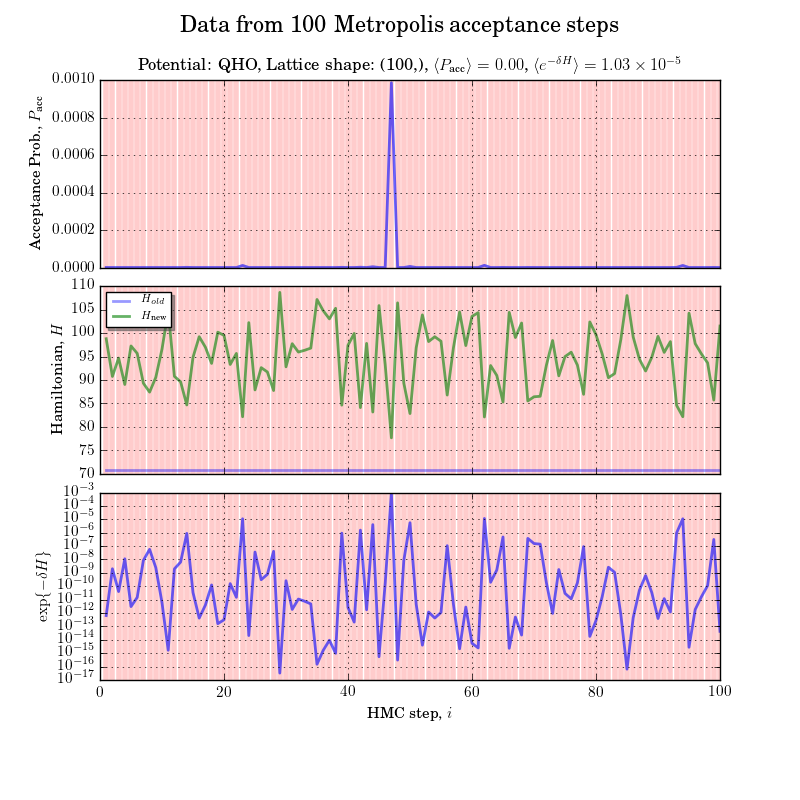
suspect the issue is rooted in python's tendency to share variable memory locations!
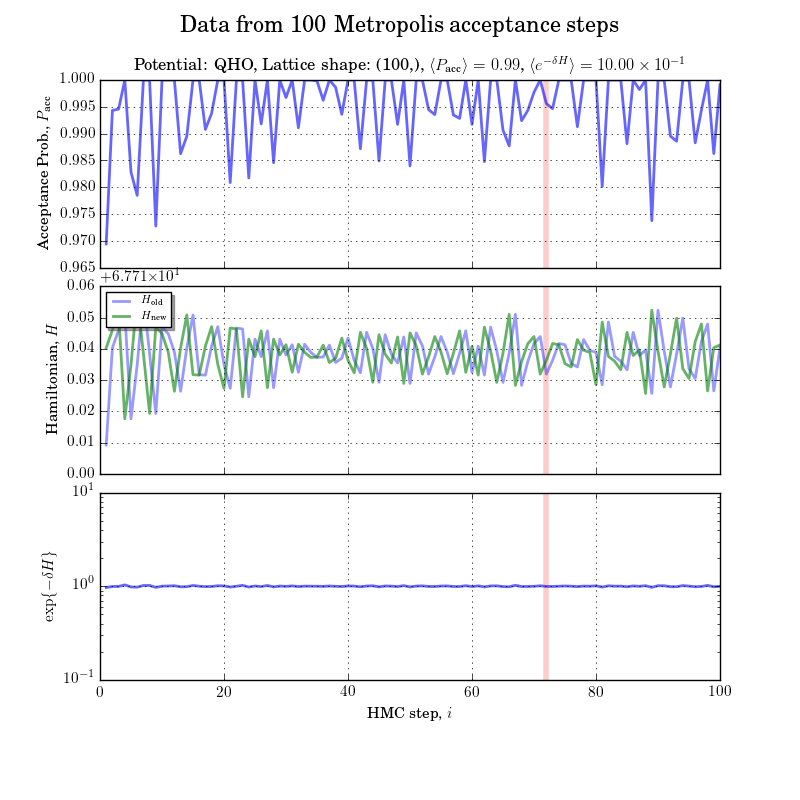
Code changes as follows
p,x = self.p.copy(), self.x.copy()self.p, self.x in `h_old = self.potential.hamiltonian(self.p, self.x)self.p -> p and self.x -> x in hmc.dynamics def move(self, step_size = None, n_steps = None, mixing_angle=.5*np.pi):
# Determine current energy state
# p,x = self.p.copy(), self.x.copy()
h_old = self.potential.hamiltonian(self.p, self.x) # get old hamiltonian
# The use of indices emphasises that the mixing happens point-wise
p = np.zeros(self.p.shape)
for idx in np.ndindex(self.p.shape):
p[idx] = self.momentum.generalisedRefresh(p[idx], mixing_angle=mixing_angle)
# Molecular Dynamics Monte Carlo
if (step_size is not None): self.dynamics.step_size = step_size
if (n_steps is not None): self.dynamics.n_steps = step_size
p, x = self.dynamics.integrate(self.p, self.x)
# # GHMC flip if partial refresh
p = self.momentum.flip(p)
# Metropolis-Hastings accept / reject condition
h_new = self.potential.hamiltonian(p, x) # get new hamiltonian
accept = self.accept.metropolisHastings(h_old=h_old, h_new=h_new)
if not accept: p, x = self.p, self.x # return old p,x
return p,xCan see that the see occurs when mixing_angle != 0 i.e. when the momentum is refreshed
n_samples=10, n_burn_in=0, step_size=0.1, n_steps=10, mixing_angle=0, accept_all = True, spacing=1.
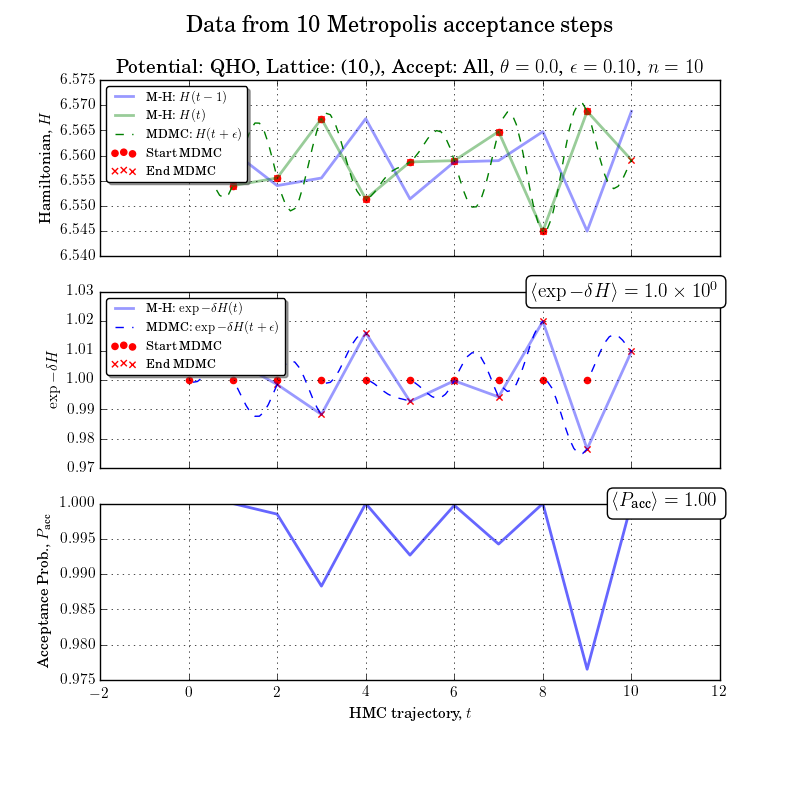
n_samples=10, n_burn_in=0, step_size=0.1, n_steps=1, mixing_angle=0, accept_all = True, spacing=1.
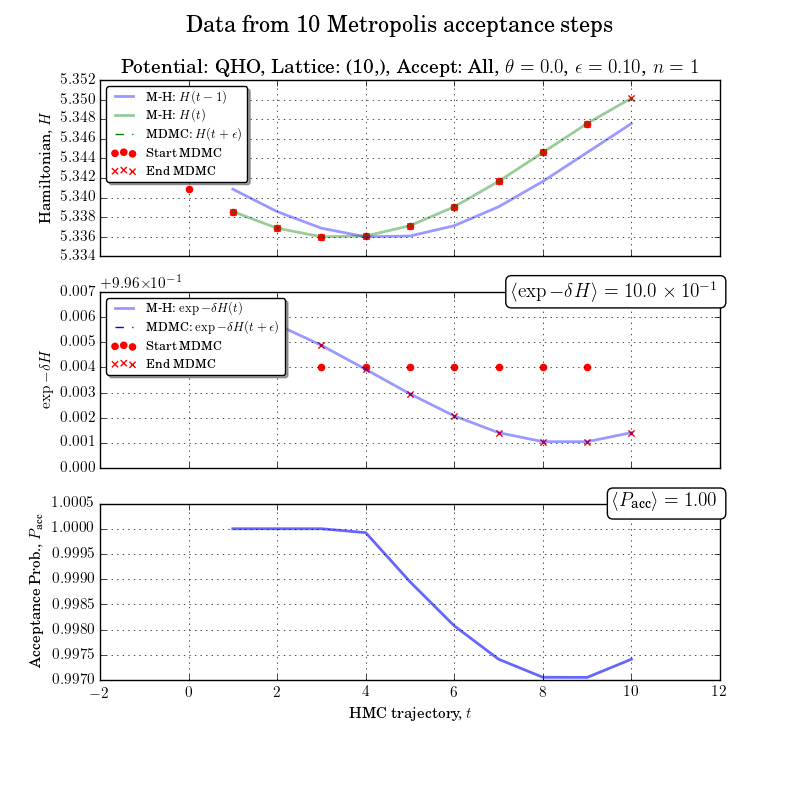
n_samples=10, n_burn_in=0, step_size=0.1, n_steps=10, mixing_angle=np.pi/2., accept_all = False, spacing=1.
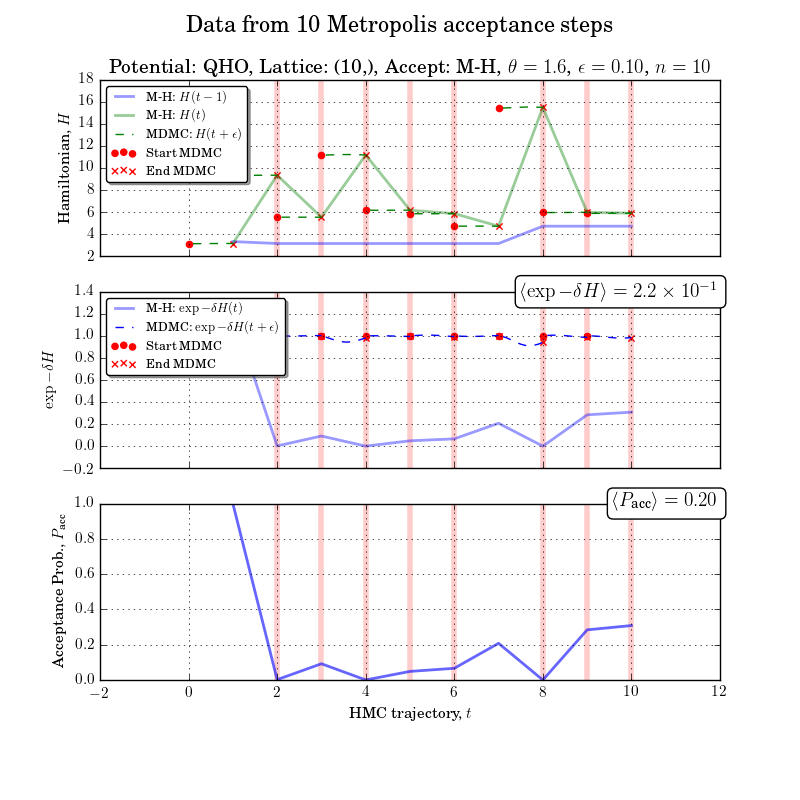
n_samples=10, n_burn_in=0, step_size=0.1, n_steps=10, mixing_angle=np.pi/2., accept_all = True, spacing=1.
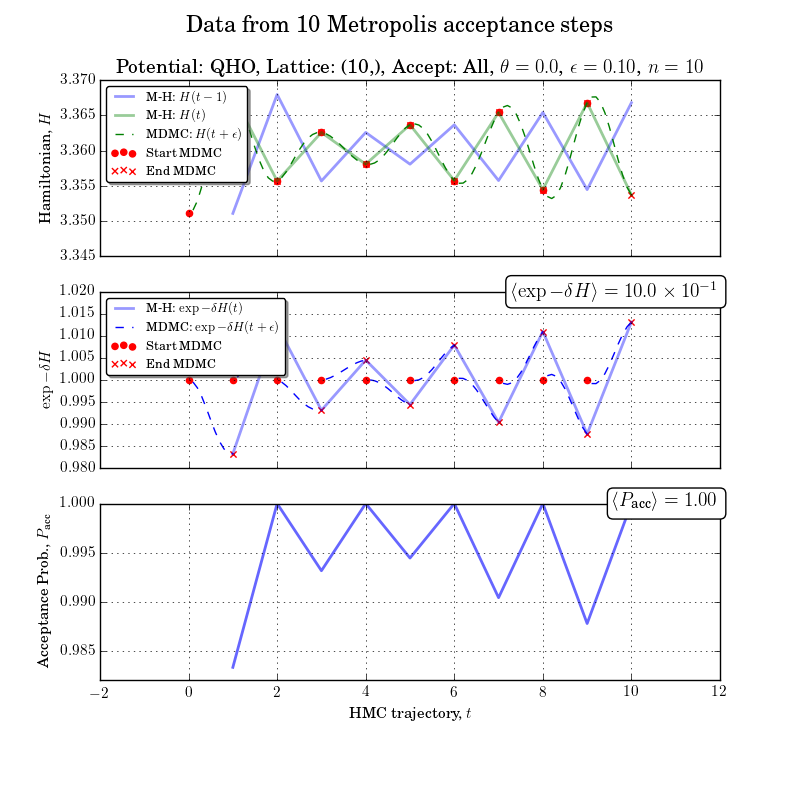
changing:
# Determine current energy state
p0, x0 = p.copy(), x.copy()
# The use of indices emphasises that the
# mixing happens point-wise
for idx in np.ndindex(p.shape):
# although a flip is added when theta=pi/2
# it doesn't matter as noise is symmetric
p[idx] = self.momentum.generalisedRefresh(p[idx], mixing_angle=mixing_angle)to measuring the initial Hamiltonian after the momentum refreshment seems to be the issue:
# The use of indices emphasises that the
# mixing happens point-wise
for idx in np.ndindex(p.shape):
# although a flip is added when theta=pi/2
# it doesn't matter as noise is symmetric
p[idx] = self.momentum.generalisedRefresh(p[idx], mixing_angle=mixing_angle)
# Determine current energy state
p0, x0 = p.copy(), x.copy()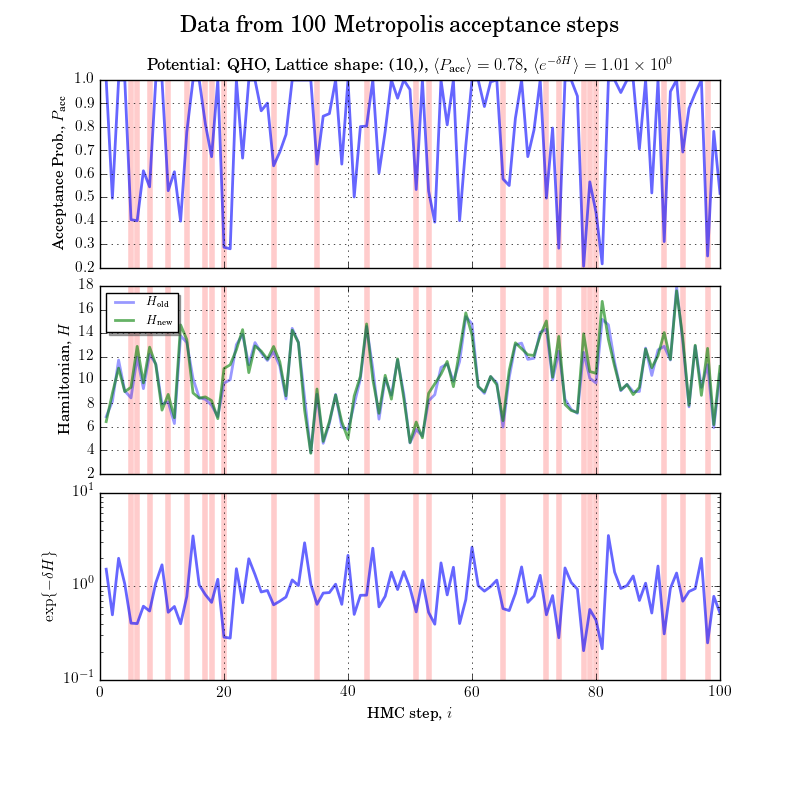
This give a correlation function as:
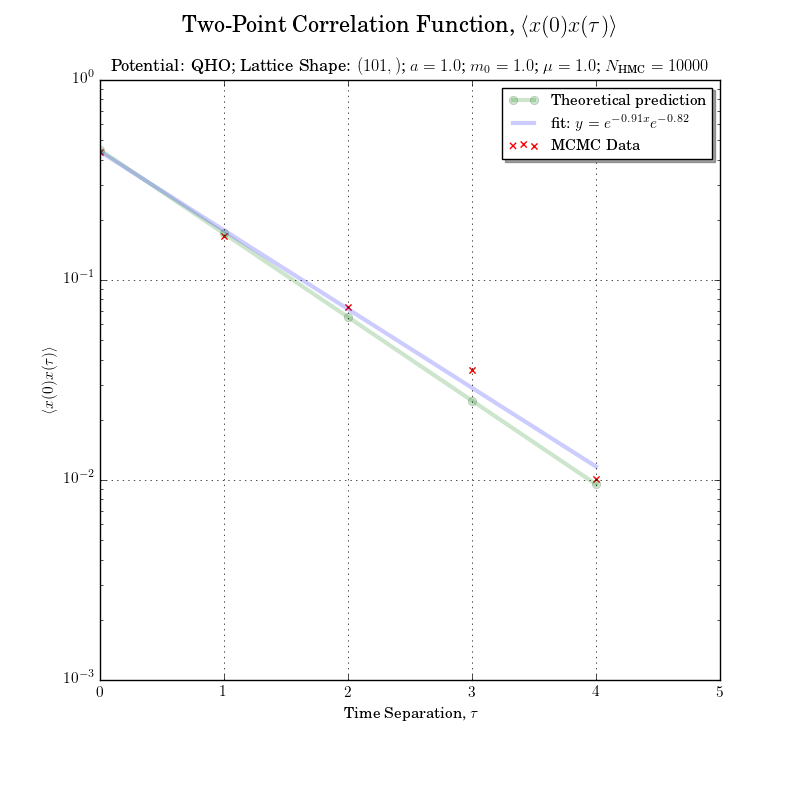
but, still, the number of simulations required is wildly high.
nothing more productive to do in this issue - all tests have passed so if there is any further issue it will have to be uncovered by other means.
Issue
~87%~58%exp{-∆H} ~ 1.3exp{-∆H} ~ 95n_steps=20, step_size=.05, dim = 1; n=1step_size=.1, n_steps=20, spacing=1., dim = 1; n=10Resolution
hmc.dynamicsare fine as per checks.hmc.hmc,hmc.potentialsTry different configurations of parametersdone - still high∆H<x^2>and other measurements to further validate HMC